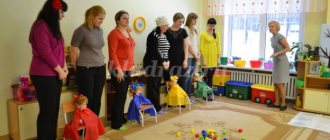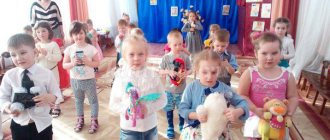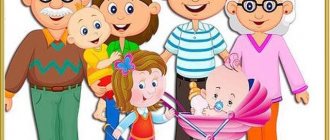Long-term plan for working with parents in the senior group according to the Federal State Educational Standard for the year
Long-term plan for working with parents in the senior group of preschool educational institutions
Description of the material: this material will be useful to educators. Goals The goal of working with parents is to find an individual approach to each child and enrich the educational experience of parents. Areas of work : dissemination of useful pedagogical knowledge among parents; — providing practical assistance to the family in raising a child; — activation of family interest in issues of education and upbringing of the child; — formation of uniform requirements for a systematic approach to the issues of raising and educating a child in a preschool educational institution and in the family; — continue to work on building a trusting attitude of parents towards the preschool educational institution; — providing assistance to parents in raising a child and replenishing the information bank. Objectives : to improve partnerships between parents and educators by identifying common interests; — comprehensive support for the family in matters of raising and educating children; — the use of effective technologies in working with parents, built on psychological and pedagogical partnership. Principles - staff and parents bear equal responsibility in the upbringing and education of children;
— trust and respect between the teacher and the families of the pupils is the basis for the full development of the personality of each child; — effectiveness and assessment of the results of interaction between the preschool educational institution and the family. September
Parent meeting “Developmental Features of Children 5-6 Years Old” Purpose:
to become familiar with the requirements of the kindergarten education program for preschoolers 5-6 years old, to enrich and enhance the experience of parents.
Conversation with parents “Children’s clothing in the off-season” Goal:
enriching the pedagogical knowledge of parents.
Folder “Age characteristics of children of senior preschool age” Goal:
to enrich the educational experience of parents, disseminate pedagogical knowledge among parents.
Photo exhibition “The best moments of summer!” Fair
October
Workshop “First steps on the steps of financial literacy” Master class “Raising financial literacy in children” Goal:
to introduce parents to this issue, based on the requirements of modern times and in practice to help start this work in the family.
Folder “Autumn” Purpose:
to enrich the educational experience of parents.
Questionnaire “Child's Play Corner in the Family” Purpose:
analysis of information about pupils and their families.
Consultation “Autumn Vitamin Calendar” Purpose:
to educate parents in the health of children and the prevention of certain diseases.
Memo on traffic rules Purpose:
familiarization with the requirements of the education and training program in kindergarten on traffic rules
November
Round table “Reward or punish” exchange of opinions and experiences. Goal:
establishing partnerships with the families of pupils, improving the psychological and pedagogical knowledge of parents.
Exhibition “Gifts of Nature” Goal:
to activate parents in the lives of children and develop creative interaction.
Visual information material “Fire Safety Rules” Purpose:
to introduce the family to the issues of forming the foundations of fire safety in a child.
Design of the album “My Family” Goal:
inclusion of parents in the work of the group, development of positive relationships.
Autumn fun. Questionnaire “Your child’s speech” Purpose:
to identify problems on this issue in order to plan further work and positively influence the development of children’s speech.
December
Parents’ meeting “Features and problems of speech development in older children” Goal:
updating parents on the problem of children’s speech development in modern conditions.
Consultation “Practical advice to parents on developing financial literacy in preschool children” Goal:
to teach parents to help children master basic economic relations in an entertaining and playful way at home.
Folder-moving “Zimushka-winter” Goal:
implementation of a unified approach of kindergarten and family in organizing cognitive and research activities of children.
Father Frost's workshop. New Year's carnival. Goal:
demonstration of the creative abilities of children and parents, developed creative skills, development of positive, emotional interaction between parents, children and preschool employees.
Memo “Safe steps on the path to road safety in winter” Goal:
implementation of a unified educational approach when teaching a child the rules of the road in kindergarten and at home.
January
Exhibition of children's drawings “By the edge of the forest, Winter lived in a hut...” Goal:
to attract parents to joint artistic creativity with their children.
Conversation “Child and Computer” Purpose:
to familiarize parents with the rules for organizing a child’s work on a computer so as not to harm their health.
Environmental campaign “Feed the birds in winter” Goal:
implementation of a unified approach to developing a caring attitude towards nature among preschoolers.
Questioning of parents “Identification of parents’ satisfaction with the quality of education, the work of the teaching staff of the senior group of preschool educational institutions Goal:
to identify the level of satisfaction of parents with the quality of education; analysis of information.
February
Parent meeting. Workshop “Introducing children to the professions of adults through role-playing games” Goal:
increasing the pedagogical competence of parents on the problem of gaming activities of children of senior preschool age.
Consultation “How to spend a day off with your child” Goal:
enriching the pedagogical knowledge of parents.
Individual conversation with parents “Sports shoes and clothing for a child for physical education in physical education.” in the hall and on the street" Goal:
improving the pedagogical knowledge of parents.
Exhibition of children's drawings “Defenders of the Fatherland” Memo for parents “Economic Dictionary” Goal:
implementation of a joint approach in teaching children the basics of financial literacy.
An open demonstration for parents on developing the foundations of financial literacy in children of the senior group of preschool educational institutions. Goal:
introducing children of the senior group to the world of economic values and nurturing ethical behavior in society.
Memo “Reflective elements” Goal:
implementation of a unified educational approach when teaching a child traffic rules in the family and preschool educational institutions
March
Maslenitsa Goal:
attracting parents to participate in the holiday, developing positive emotional interaction between the teacher, parents and children.
Visual and informational material “Nature in Spring” Goal
: implementation of a unified approach to developing a caring attitude towards nature in preschoolers and organizing research activities in preschool educational institutions and families.
Festive concert dedicated to International Women's Day. Goal:
to demonstrate children’s creative abilities, developed skills and abilities, to develop an emotionally positive attitude among children’s parents and preschool employees.
Action “ABC of Road Traffic” Goal:
implementation of a unified approach to teaching traffic rules in kindergarten and at home.
Consultation “Development of verbal and logical memory of children 5-6 years old” Goal:
developing the pedagogical competence of parents. To develop parents' interest in using various forms of organizing joint activities with children.
April
Consultation “Mathematical development of children in the family” Goal:
dissemination of pedagogical knowledge among parents, practical assistance to the family in raising and educating the child.
Book exhibition. “Creativity and works of V. Bianchi” Goal:
implementation of a unified approach for kindergarten and family to familiarize themselves with fiction.
Sports festival “Mom, Dad, I am a sports family!” Goal:
interaction between parents, children and preschool employees.
Advice from a psychologist “Developing fine motor skills of the hands” Goal:
dissemination of psychological and pedagogical knowledge among parents of future schoolchildren, practical assistance to the family.
Conducting a cleanup day to improve the territory of the preschool educational institution. Goal:
to unite the efforts of employees of the child care institution and parents to improve the territory of the preschool educational institution, to form friendly, partnership relations with the families of the pupils.
May
Exhibition of children's drawings “Road ABC” Goal:
implementation of a unified approach for kindergartens and families to teach children traffic rules.
Action “Immortal Regiment” Goal:
implementation of a unified approach of kindergarten and family in the work on patriotic education.
Open week. Goal:
to build trust and respect between the teacher, preschool staff and parents of pupils.
Demonstration of all types of educational work of the institution, establishment of partnerships. Final parent meeting “Our successes” Goal:
summing up the educational activities of the group, increasing parents’ awareness of the life of children in preschool educational institutions for the year.
We recommend watching:
A long-term plan for interaction between a physical education instructor and the teaching staff. A long-term plan for an elective in the middle group of a preschool educational institution. A plan for working with parents in the second junior group according to the Federal State Educational Standard for a year. A long-term plan for working with parents in kindergarten for a year. Senior group
Similar articles:
Long-term plan for reading fiction for the younger group according to the “Kindergarten 2100” program
Conversation with parents on the topic “Play with children!”
Conversation with parents
Topic: “Game is not fun”
In order for our children to have a happy childhood, play should occupy the main place in their lives. In childhood, a child has a need for play, and it needs to be satisfied not because there is time for work, but an hour for fun, but because by playing, the child learns and experiences life.
“Play permeates our entire life as a child; this is the norm even when the child is doing something serious. He has this passion, and it must be satisfied. Moreover, his entire life should be imbued with this game. His whole life is a game." The famous psychologist A.S. Makarenko reminds us, adults, of these common truths.
If you do not play and do not guide your child’s play from an early age, then the child will not develop the ability to play both independently and with other children.
The games of such children boil down to aimlessly rolling a car or rocking a doll. Finding no other use for toys, children quickly give up playing and demand new toys.
HOW TO PLAY WITH CHILDREN.
In preschool age, play becomes a means of development and education if it is built on meaningful communication with adults.
When playing with your daughter or son, remember that you cannot suppress the baby’s initiative. Play with him as equals. When playing, watch your speech: the even, calm, friendly tone of an equal playing partner instills in the child confidence that he is understood, his thoughts are shared, and they want to play with him.
The child’s interest in independent play will become more and more noticeable, but this is not a reason to let the game take its course.
A child simply cannot play alone all day. You suddenly discover that he repeats the same actions, is clearly bored, takes up one thing after another, uses toys for other purposes.
Therefore, we must make it a rule: to engage in the baby’s play several times a day, this encourages the child to take new actions and, in turn, contributes to more successful mental development.
What toys should I buy for children?
You and I spend a lot of money on our children's toys. What toys do children need? What should you consider when buying a toy? Do you need to divide toys according to the principle for boys and girls? What toy do you think is good?
What is a good toy?
First of all, it is safe (without sharp corners and toxic paint), certified and age-appropriate.
There is no need to give a 3-year-old child a complex construction set. This is a good toy, but it is not suitable for age.
The child will try in vain several times to connect the parts, and then throw them aside in frustration. Moreover, he will remember this failure and disappointment and will not play with anything similar for a long time.
The more diverse the toys, the more interesting and varied the children’s games.
But a variety of toys does not mean their abundance; it is enough to have 2-3 toys of the same type. When a child has many identical toys, this limits his interest, experience, and therefore his development.
You should not buy toys specifically for boys or girls. Kids equally need dolls, cars, mechanical toys and construction sets.
If you decide to buy your son a toy truck, dump truck, crane, or tractor, then you need to tell him as much as possible about these machines in order to provide food for the development of children's imagination in the game.
The child should not just be given a toy, but name it, explain how to handle it, play with him, showing different options for the game (set up a room for dolls, invite all the toys to a birthday party).
It is necessary to take into account the interests and inclinations of the child - some like to tinker with cars, the other loves to build and asks to buy him more blocks. Don't interfere with your purposeful passion. The third one – even though he’s a boy – plays with dolls, don’t shame him for it. And for the fourth, it’s more interesting to play with household utensils, pots, and lids. Let him play - just make sure that dangerous objects are not accessible.
Undoubtedly, the child is disturbed by the fact that he sees too many toys at the same time.
I played with one for a bit and the other caught my attention.
As a result, it turns out that, without exhausting their capabilities, the toys become boring to the baby. Therefore, remove some of the toys and change them from time to time. Homemade toys (made of clay, cardboard, paper, wood, fur) are of great educational importance. Treat with great respect what the child has made with his own hands, do not consider it trash that can be thrown away.
IF CHILDREN DO NOT PICK UP THE TOYS.
What do you do if your child doesn’t put away his toys?
Many parents, without waiting for their child to put away the toys, do it themselves, making a big mistake.
Sometimes, if a child refuses to do something, you can resort to little tricks.
Offer to remove toys in a playful way:
- Who will restore order faster - you or me? You put away your toys, and I will wash the dishes.
-The game “Cunning Eye” - invite the child to become a wizard, that is, close his eyes, put his palms together and say: “I have a cunning eye, he always sees toys that are out of place.”
- Turn to the doll, whispering in the ear - “look Katya, how my daughter Nadya will put away the toys,” etc.
ARE YOUR CHILDREN THOROUGH?
Teach children to care for toys: wash doll clothes, wash toys. Do not allow throwing dolls, pulling their legs or hair. Don't make an example of this. If a child breaks a toy, do not rush to throw it away. A toy repaired by an adult in the presence of a child will be more expensive than a new one.
Repairing a toy can be played out - You are Doctor Aibolit, and the child is a nurse.
Where to store toys?
All toys should be within the child’s field of vision and stored on open shelves. Some of them can be removed and only those that he needs to play now can be left on display. Books, plasticine, pencils are not toys. Make a special place for them.
What to do if you are tired of the noise your baby makes?
Your child is active and mobile. This is good. But now he can learn to play quietly, if only you teach him this. Try playing with him in silence. The kid loves everything that is called play, because playing is the most interesting activity in life.
That's how it should be.
Conclusion.
Let us, dear parents, be closer to our children - and let us not be strict judges, commanders, watchmen for them, but good advisers, helpers, and play partners. Don't waste your free time playing with your children.
For a child, playing with you is a thousand times more interesting and useful than any toy. Hundreds of amazing toys will not replace the joy he gets from playing with you.



